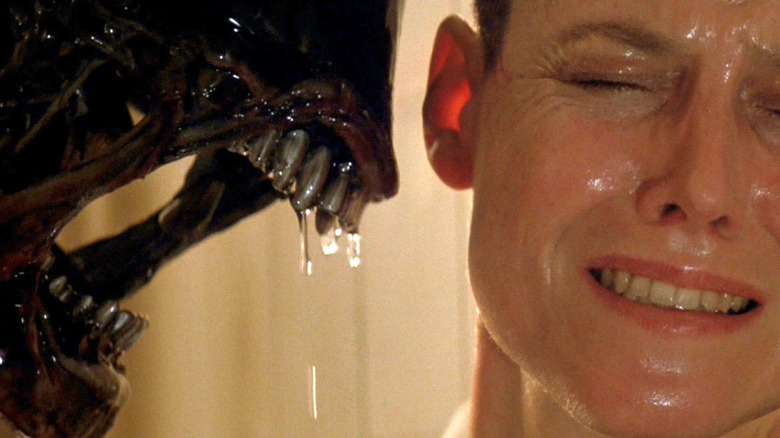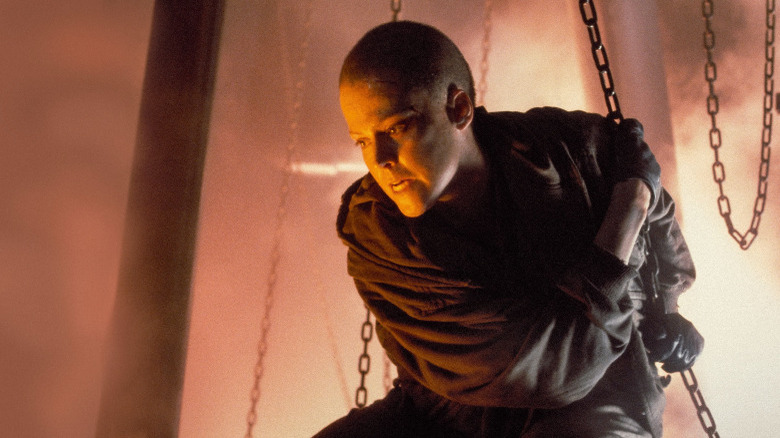James Cameron's Honest Assessment Of Alien 3 Might Surprise You
James Cameron's "Aliens" is an oft-cited example of how to make a great sequel to a classic, and for good reason. The director's 1986 followup to Ridley Scott's "Alien" is an action-packed romp that trades in the claustrophobic look and feel of Scott's 1979 sci-fi horror movie for a thrilling shoot-em-up full of memorable lines ("Game over, man!") and exciting humans vs. aliens battles. At the same time, it carries over the social commentary in Scott's film about inequality and corporate greed — making it the rare sequel that's able to build upon the movie before it thematically while forming its own distinct identity.
David Fincher's "Alien 3," on the other hand, is far less beloved than either of the first two "Alien" films. It's also no secret that production on the 1992 movie was a real mess, which ultimately led to Fincher disowning the end result. Even so, it's hard not to admire the film, if only for making the bold choice to quickly kill off three of the four surviving heroes from "Aliens" — once again leaving Ellen Ripley as the sole survivor of a mission-gone-wrong involving the Xenomorphs — after Cameron's sequel did its best to build them up as characters. (Yes, Ripley re-activates the android Bishop later on, but he's shut down right after, so the point stands.)
Understandably, however, Cameron had different feelings on the matter. As he explained at the 30th-anniversary celebration of "Aliens" at the 2016 International Comic-Con (via The Playlist):
"I thought [the decision to eliminate Newt, Hicks, and Bishop] was dumb. I thought it was a huge slap in the face to the fans. ['Alien 3' director] David Fincher is a friend of mine, and he's an amazing filmmaker, unquestionably. That was kind of his first big gig, and he was getting vectored around by the studio, and he dropped into the production late, and they had a horrible script, and they were re-writing it on the fly. It was just a mess. I think it was a big mistake. Certainly, had we been involved we would not have done that, because we felt we earned something with the audience for those characters."
What Makes the Alien Movies Unique
At the time that Cameron made his comments, "District 9" director Neill Blomkamp was busy trying to make an "Alien" film that would basically ret-con "Alien 3" and 1997's "Alien Resurrection" by reviving Newt and Hicks. Cameron, as you might imagine, was all for the idea, saying it worked "gangbusters" and praising Blomkamp's "very strong" script (which he had read). In the end, though, the movie was scrapped in favor of Scott's "Alien: Covenant," the 2017 sequel to the director's own 2012 "Alien" quasi-prequel, "Prometheus."
Looking back from the present, I think it might be a good thing that Blomkamp's "Alien 5" never came to pass. One of the best things about the six "Alien" movies we have — not counting the "Alien vs. Predator" crossover films — is how genuinely different they are from one another, as well as how they reflect the voices of the filmmakers behind them. Where "Alien" is an eerie slasher movie in space (where the killer is an acid-blooded alien creature), "Aliens" is a blast of sci-fi fun with good characters and thoughtful messages at its core. "Alien 3" and "Resurrection" don't lose sight of the franchise's anti-corporate themes either, even if their attempts to combine them with, respectively, Fincher's signature bleakness and "Resurrection" helmer Jean-Pierre Jeunet's gnarly absurdism were only partly successful at best, confounding at worst.
As for "Prometheus" and "Covenant": Say what you will about them, they took a big swing by bringing the "Alien" property's themes about artificial intelligence and creation to the forefront and infusing them with the desolate, misanthropic vibe that's come to define much of Scott's output as a director in the 21st century. For me, this has proven to be a far more interesting approach than the idea of going back and trying to undo what Fincher did with the franchise 30 years ago.

